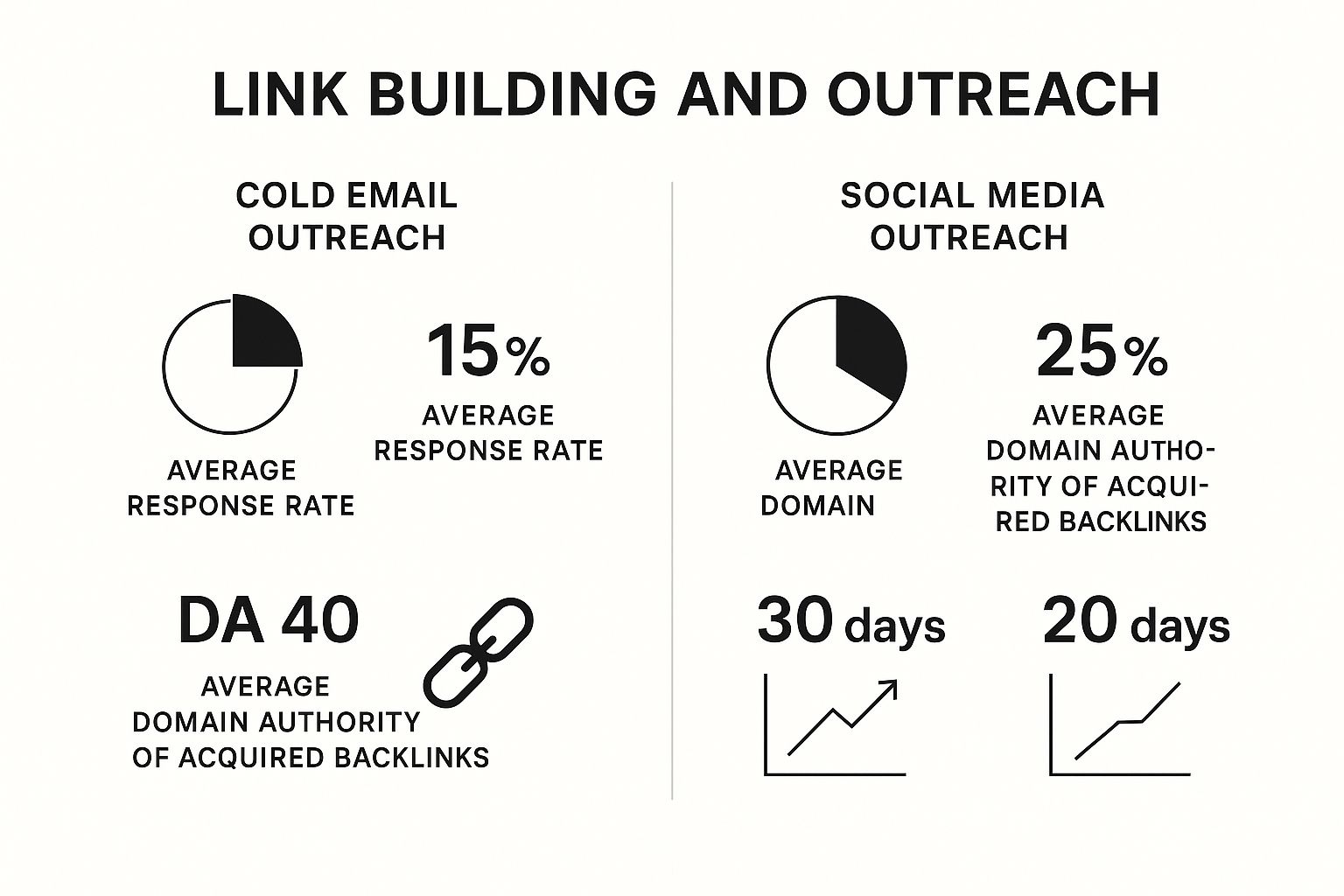Use ChatGPT for SEO: Get Your Brand Featured in AI Responses
Why Your Brand Needs to Win the AI Search Game
Let's be honest, most businesses are so fixated on Google rankings they're missing a huge shift: millions of people are now using ChatGPT for the same searches they used to Google. Think about it, when someone asks ChatGPT "best Italian restaurants," is your place even mentioned? If not, you're already falling behind. I've been chatting with business owners who are ahead of the curve on this, and they're seeing a real impact. Getting featured in AI responses is becoming just as crucial as landing on Google's first page.
This isn't just about chasing the latest trend. AI search is fundamentally different from traditional search. People are using more conversational language, asking more complex questions, and expecting more nuanced answers. This means the old SEO tricks – keyword stuffing, thin content, and shady backlink schemes – are completely useless now. Forward-thinking businesses are ditching those tactics and focusing on strategies aligned with how people actually use AI for search. This means creating genuinely useful content, building real expertise, and structuring content in a way AI can understand and reference.
Let me give you an example. When planning a trip, do you Google "flights to Rome" or ask ChatGPT "I want to spend a week in Rome in October, what's the best way to get there and what should I do?" See the difference? AI handles those richer, more contextual queries. This shift creates huge opportunities for businesses that get how to use ChatGPT for SEO. Instead of targeting "best coffee beans," you can target the whole conversation around "how to brew the perfect cup of coffee at home."
This new environment demands a fresh perspective. You need to know how to structure your content, the kind of information AI values, and how to position your brand as an authority. Think of it this way: Google is a library; you search for specific books. ChatGPT is a knowledgeable friend giving personalized recommendations. You wouldn't ask a friend for a list of every book on a topic – you'd ask for their expert opinion.
As of June 2026, ChatGPT's daily search volume was estimated at 37.5 million in 2024, showing its growing influence. While Google's estimated 14 billion daily searches dwarf this, the rapid growth of AI search signals a change in how people look for information. Even with this growth, Google's market share stayed above 90%. To get a better understanding of ChatGPT usage, check out this article: ChatGPT usage trends. Google is still the king, but ignoring AI search is like ignoring social media a decade ago. Don't get left behind while your competitors are already winning the AI search game.
To help you visualize the current search landscape, I've put together a comparison table:
ChatGPT vs Google Search Volume Comparison
This table breaks down the search volumes, user behavior, and growth patterns between ChatGPT and Google.
| Platform | Daily Searches | Monthly Visits | Growth Rate | Market Share |
|---|---|---|---|---|
| ~14 Billion | Billions (Exact figures not publicly available) | Stable, single-digit growth | >90% | |
| ChatGPT | ~37.5 Million (2024 estimate) | Millions (Exact figures not publicly available) | High, triple-digit growth | <1% (but rapidly increasing) |
Key takeaway: While Google's market share remains dominant, ChatGPT's rapid growth indicates a shift in user behavior and highlights the increasing importance of AI in search.
This table highlights the stark difference in scale but also the impressive growth trajectory of ChatGPT. While Google remains the dominant force, the writing is on the wall: AI is changing the search game, and businesses need to adapt.
Mining AI for Keywords Your Competitors Haven't Found
Forget those generic keyword research tools. ChatGPT can unearth search opportunities that traditional tools miss-but only if you know how to talk to it. I've found that crafting specific prompts can uncover hidden goldmines of long-tail keywords, semantic variations, and crucial user intent patterns.
Here's a screenshot from a recent ChatGPT session:

Notice how I'm asking for keywords related to a specific problem – "frustrations with online banking." This approach digs way deeper than simply asking for keywords related to "online banking." You get insights into the actual language customers use when they're having trouble, which is pure gold for crafting targeted content.
For more on using AI for search, check this out: Check out our guide on Generative Search Optimization.
Uncovering Hidden Keyword Gems
One of ChatGPT's superpowers for SEO is understanding how your customers really talk. Think about it – typical keyword research tools often give you dry, generic keywords. But what are people actually typing into Google or asking their smart speaker? ChatGPT can bridge that gap.
You can also use it to build out comprehensive keyword clusters. Say your main topic is "organic gardening." You could ask ChatGPT for related keywords around subtopics like:
- Pest control
- Composting
- Soil health
This creates a rich web of keywords, helping you own those search results.
Finding the Questions Your Audience is Asking
Another huge benefit is uncovering questions your audience is asking that you haven't even thought of. I'm constantly surprised by the insights I get from prompting ChatGPT with questions like "What are people asking about [my topic]?" This reveals content gaps, which equal real traffic opportunities.
But here's the thing: validating these AI-discovered keywords is key. Don't just take ChatGPT's output as fact. Cross-reference it with real search data using tools like Google Keyword Planner or SEMrush to make sure those keywords have actual search volume.
Validating and Refining Your Keyword Strategy
This validation process ensures you're focusing on keywords that actually bring in visitors. You're not just creating content for the sake of it; you're creating content people are actively searching for.
You can also refine your content strategy by identifying high-volume, low-competition keywords – the sweet spot for SEO success. By combining the power of ChatGPT with traditional keyword research tools, you create a robust and effective SEO strategy. This blend of AI insight and data-driven validation is your key to unlocking those hidden keyword gems and getting real results.
Creating Content That Gets You Mentioned in AI Responses
Getting mentioned in ChatGPT responses isn't about gaming the system. It's about establishing yourself as the go-to expert, the source AI naturally leans on. Think of it like asking for advice – you'd go to someone knowledgeable, right? AI operates similarly, prioritizing credible and authoritative sources. This means concentrating on crafting quality content with a solid structure and real depth, offering genuine value to both humans and AI.
One key is clear organization. Think of a well-structured presentation: distinct headings, bullet points, and concise paragraphs. These elements help people (and AI) quickly grasp your key points. Imagine searching for a fact in a wall of text compared to a well-organized document. The latter is far easier, and AI appreciates that same structured clarity.
Going deep is also crucial. Instead of surface-level information, delve into your topics. Offer unique insights, original research, and data-driven analysis. This establishes your brand as an authority. It's the difference between general knowledge and specialized expertise that ChatGPT can confidently cite. This isn't about using ChatGPT for SEO; it's about becoming the resource ChatGPT uses.
ChatGPT's influence on SEO has exploded since its launch, mainly because people are asking it the same questions they used to Google. ChatGPT's monthly visits skyrocketed from 264.7 million in December 2022 to nearly 5 billion by December 2024. Learn more about ChatGPT's impact on search here. This means your content needs to be optimized for both traditional search engines and these conversational AI platforms.
This shift underscores the importance of dual-purpose content: informing your human audience while providing easily digestible information for AI. Optimizing for both humans and AI maximizes your reach and increases your chances of appearing in AI responses, boosting traffic and strengthening your online presence. This approach ensures you're not just creating content; you're building a valuable resource for everyone.

Making Your Website AI-Friendly Without Breaking SEO

You've poured your heart into creating amazing content. But how do you ensure AI systems actually see it? It all comes down to your website structure. Think of your site like a well-stocked library. If the books are strewn about haphazardly, nobody can find anything. The same applies to your website's information architecture: if it's a mess, AI will struggle to understand and reference your content.
This means using ChatGPT for SEO isn't just about the words themselves, but how you present them. Schema markup, clear headings, and a logical site structure are essential. These elements not only make your site more AI-friendly, but they're also great for traditional SEO. A true win-win!
For instance, schema markup helps AI instantly grasp your content's meaning. It's like adding clear labels to those library books. Similarly, using clear H2 and H3 headings makes your content easily scannable for both humans and AI, helping ChatGPT extract key info to potentially feature your brand in its responses. Curious to learn more? Check out this post on AI and SEO.
Structuring Your Information for AI and Humans
Think about how you organize content on individual pages. Break up dense text with bullet points and short paragraphs. This boosts readability and helps AI parse and categorize information. It's like giving each "book" on your website a clear, concise table of contents.
Beyond individual pages, consider your overall site architecture. A logical structure helps AI navigate your site and understand how different pieces of content relate. If you have several blog posts about "use chatgpt for seo," link them together. This reinforces your topical authority and helps AI recognize your expertise.
Optimizing for Citation and Brand Visibility
Pay attention to elements like your About Us page, author bios, and content attribution. These details build trust and increase the likelihood of ChatGPT citing your brand as a source. It's about building your reputation within the AI ecosystem. Just as respected authors get cited more, websites with clear expertise become go-to references for AI.
Finally, real-world examples are invaluable. Analyze websites already cited by ChatGPT. What sets them apart? It often boils down to a combination of high-quality content, clear structure, and strong authority signals. By following these principles, you can make your website a magnet for both human visitors and AI, driving more traffic and boosting brand visibility.
Building the Kind of Authority That AI Systems Notice
Authority in the age of AI isn't just about backlinks and domain authority anymore. It's about being the recognized expert that AI systems, like ChatGPT, trust enough to cite and recommend. It's like asking a friend for advice – you go to the person with real experience, not someone who says they know it all.
This requires a new approach. Instead of chasing metrics, focus on becoming the ultimate resource in your niche. Check this out: how to get your brand noticed by AI. Create in-depth, authoritative content that truly answers your audience's questions. In the fitness world, for instance, go beyond generic workout videos. Explore specific training methods, nutrition plans, or injury prevention – become the source for reliable information.
This infographic highlights the difference between traditional outreach and a more targeted strategy:

Strategic outreach means better response rates, higher-quality backlinks, and faster results. While traditional methods still have a place, prioritizing quality is key for true authority.
Documenting and Sharing Your Expertise
Building authority means actively showcasing your expertise. Develop in-depth case studies, share original research, and contribute to industry publications. This not only demonstrates your knowledge but establishes you as a thought leader.
Also, build relationships with other experts. Guest blog on reputable sites, attend industry events, and participate in online communities. These connections can lead to valuable mentions and citations, boosting your credibility with AI.
This is mirrored in how businesses are using AI. A recent survey showed 75% of businesses and marketers plan to use ChatGPT for customer responses, directly affecting SEO and content marketing. Another 44% will use it for multi-language content, impacting global reach and local SEO. Find more AI and SEO trends here. This shows the growing need for AI-recognized authority.
To illustrate the evolving approaches to authority building, let's look at the table below:
Let's talk about how to build the kind of authority that AI systems notice. It's no longer just about backlinks and domain authority – those are still important, but there's more to it. Now, it's about becoming a recognized expert that AI, like ChatGPT, sees as trustworthy and reliable.
The following table compares traditional authority-building tactics with strategies designed for AI recognition:
Authority Building Strategies: Traditional vs AI-Focused Approaches
| Strategy Type | Traditional SEO Impact | AI Recognition Value | Implementation Difficulty | Time to Results |
|---|---|---|---|---|
| Backlink Acquisition | High | Medium | Medium | Medium-Long |
| Content Creation (General) | Medium | Low | Easy | Medium |
| Content Creation (AI-Focused) | Medium | High | Medium | Medium |
| Expert Engagement & Networking | Medium | High | Medium-High | Long |
| Technical SEO Optimization | High | Low | Medium-High | Medium |
| Structured Data Markup | Medium | High | Medium | Short-Medium |
| Schema Markup Optimization | Medium | High | Medium | Short-Medium |
As you can see, while traditional SEO practices remain important for foundational visibility, AI-focused strategies play a crucial role in gaining recognition from AI systems. Things like structured data markup, schema optimization, and creating content tailored to AI understanding are becoming increasingly valuable.
By focusing on real expertise, valuable content, and strategic networking, you can position yourself as a trusted source. This attracts both human audiences and the AI that shapes the online world.
Tracking Your AI Search Success Beyond Traditional Metrics
Sure, keyword rankings and organic traffic are your bread and butter SEO metrics. But let's be real, they only tell part of the story, especially with the rise of AI search. You could be ranking #1 on Google for a key term, but what if your brand is nowhere to be found when someone asks ChatGPT about your industry? That's a whole different ball game. We've got to start thinking beyond those traditional metrics and track our AI search visibility directly.
This means keeping tabs on how often your brand gets mentioned in AI responses. How do you do this? Well, a few ways. You can use a tool like Sellm, which is specifically designed to track brand mentions in AI environments like ChatGPT.
Alternatively, there's the good old-fashioned manual approach: regularly searching within the AI platform yourself. Ask questions related to your industry and see if your brand shows up. A simple spreadsheet can work wonders to track these mentions over time.
This kind of tracking gives you valuable feedback on which optimization tactics are actually moving the needle. For example, let's say you've been focusing on creating authoritative content around "use chatgpt for seo." If you start noticing your brand popping up more often in ChatGPT's responses to related queries, that's a pretty good sign your strategy is working.
Measuring What Matters in the AI Age
It's not just about tracking mentions, though. You've got to identify the metrics that really correlate with business growth in this new AI-driven landscape. Clicks from Google are great, but what about conversions driven by AI interactions?
Think about tracking how many users visit your site *after* encountering your brand through ChatGPT. Setting up custom UTM parameters to track traffic originating from AI platforms can give you a clear picture of how your AI SEO efforts are impacting lead generation and sales.
Keeping an Eye on the Competition
Competitive analysis is still essential, even in the AI search world. Just like you keep an eye on your competitors' keyword rankings on Google, you need to monitor their visibility in AI responses. This allows you to benchmark your own performance and spot opportunities to get ahead.
Are your competitors getting mentioned for keywords you're targeting? What kind of content are they creating that seems to resonate with AI systems? These insights can be pure gold for informing your own strategy.
For example, imagine a competitor consistently gets mentioned by ChatGPT for advice on "use chatgpt for seo." Take a deep dive into their content. What are they doing differently? Maybe they're focusing on specific use cases with real-world examples, or perhaps they're structuring their content in a way that AI finds easy to understand. These observations can give you actionable ideas for improving your own content and boosting your AI visibility.
By tracking these new metrics, you'll gain a much deeper understanding of how to succeed in the ever-evolving world of AI search. Don't just optimize for Google – optimize for the future of search itself.
Your Roadmap to ChatGPT SEO Domination
Let's talk strategy. Think of this as your personalized action plan for getting your brand noticed by ChatGPT. No fluff, just practical advice based on real-world experience. We'll concentrate on the most effective strategies, considering your current SEO situation and available resources, and give you realistic expectations about when you might see results. Plus, I'll share some troubleshooting tips I've learned along the way-because let's be honest, sometimes things don't go as planned. And to make sure you're always on track, we'll cover how to monitor your progress and adapt as needed.
Prioritizing For Maximum Impact
If you're new to using ChatGPT for SEO, start with content optimization. Think of your website like a well-structured presentation: clear headings, bullet points, and concise paragraphs. AI loves that. Then, move on to keyword research. ChatGPT can be a powerful tool here. Don't settle for generic keywords; dig deeper to uncover those valuable long-tail keywords your competitors are missing. That's where the real traffic potential lies.
For example, instead of targeting "best dog food," try asking ChatGPT something like, "What are dog owners' biggest frustrations when choosing dog food?" This reveals the language your customers actually use – incredibly valuable for connecting with your target audience. In my experience, focusing on these niche keywords has significantly boosted traffic.
Setting Realistic Timelines and Expectations
Building authority takes time, especially in the AI world. If you're starting from scratch, be patient. It could take several months to see your brand consistently mentioned by ChatGPT. Concentrate on creating high-quality, in-depth content, and actively promote it. Think guest blogging, outreach, and engaging in relevant online communities.
If you already have a solid SEO foundation, you might see faster results. I've seen established brands start getting mentioned by ChatGPT within weeks of optimizing their content. This is because AI systems readily recognize and prioritize existing authority signals.
Troubleshooting When Things Go Wrong
Challenges are inevitable. One common issue is seeing no change in AI mentions despite your efforts. If this happens, revisit your keyword strategy. Are you participating in the right conversations? Double-check your website structure, too. Is it truly AI-friendly?
Another challenge is getting mentioned for the *wrong* reasons. Perhaps your content is being misinterpreted or taken out of context. This happened to one of my clients. A poorly worded paragraph caused ChatGPT to associate their brand with something completely unrelated. A simple wording tweak solved the problem, highlighting the importance of regular monitoring and refinement.
Staying on top of the AI search game means adapting to change. Keep an eye on evolving trends, understand how people are using AI, and constantly refine your strategy. This will ensure your brand stays visible and authoritative in the AI-driven world.
Ready to take your AI search game to the next level? Check out Sellm!
